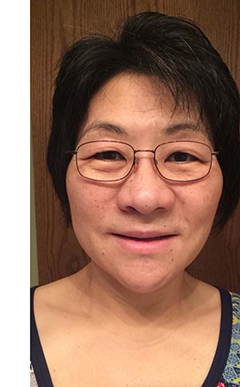
Junehee Kwon hadn't been feeling quite right for a long time.
Her body seemed to be going through all sorts of unexplained changes from swollen feet and hands that were gradually growing bigger over time to achy joints and enlarged facial features.
"I thought it was just a part of getting older," says Kwon, as she recalls the events that led to here diagnosis nearly two years ago. "But when I started leaking milk at 48 years old, I knew something wasn't right."
Kwon tried to see someone at a hospital near her hometown in Manhattan, Kansas, but was told she couldn't get in for nearly six months. Her search for a more timely appointment led her to Nebraska Medicine where she scheduled a visit with endocrinologist Andjela Drincic, MD.
"When I saw Dr. Drincic, she started asking me all kinds of really weird questions," recalls Kwon. "Are your shoes fitting more tightly? Does your wedding ring still fit? Do you have jaw pain? Are you having swelling issues? Are your joints achy?
"The answers to all of her questions were yes. It was like I was seeing a fortune teller."
"When I saw Junehee, I immediately suspected acromegaly," says Dr. Drincic. An MRI that had been sent to Dr. Drincic before the appointment, showed a tumor on the pituitary gland, which in rare cases, can cause acromegaly.
"She had many of the common symptoms – enlarged facial features, swelling and jaw and joint pain," notes Dr. Drincic. "The fact that she had diabetes, a side effect of acromegaly, also caught my attention because she was fit, had a healthy diet and had no family history."
A blood test confirmed the diagnosis. Acromegaly is a rare hormonal disorder that can develop when the pituitary gland produces excess amounts of the growth hormone. It is usually caused when a noncancerous tumor develops on the pituitary. Untreated, acromegaly can cause deficiencies in other hormones that can lead to complications like diabetes, heart disease, vision loss, sleep apnea, a shorter life expectancy and can even be life-threatening.
Once the diagnosis was made, additional testing was performed to determine what types of hormones were being affected. While many pituitary tumors can be treated with medications, those that are overproducing certain types of hormones require surgery. Such was the case for Kwon.
Dr. Drincic consulted with additional Nebraska Medicine specialists to collaborate and determine the best treatment plan. Surgical removal was recommended as Kwon's best option.
"Junehee had a rare type of secreting pituitary tumor that was causing her growth hormone level to be three and a half times the normal level," Dr. Drincic says. "She probably had the condition for several years and the changes had developed so gradually, they weren't obvious to her. The tumor needed to be removed or her condition would continue to worsen."
Kwon met with neurosurgeon William Thorell, MD, and ENT specialist Christie Barnes, MD, to discuss surgical options. "They made it all so easy," says Kwon. "I saw all three doctors during my second visit, back-to-back. I also got more labs and tests and an MRI. I left feeling very confident in their experience and skills."
Kwon's surgery was scheduled for about a month later. By surgery day, Kwon's condition had grown quite severe.
"Everything seemed to be out of whack," she says. "My eyes had become so swollen I could barely see anymore. My diabetes was out of control. My whole body was achy and swollen. I couldn't do anything."
The surgery was performed endoscopically by Dr. Thorell and Dr. Barnes. Dr. Barnes used a camera and tiny instruments that she inserted in the nose to open the nasal cavity. This allowed Dr. Thorell to get to the pituitary gland to remove the tumor.
"We perform several of these types of surgeries each month," says Dr. Barnes. "The whole process, from diagnosis to surgery requires the collaboration, expertise and skills of multiple specialists to get the optimal results. Having so many specialists in one place is one of the many benefits of receiving care here at Nebraska Medicine."
Kwon stayed in the hospital for several days for monitoring and recovery. After a couple days, she began to look like a different person, notes Dr. Barnes.

"I lost 14 pounds of water weight," recalls Kwon. "After all of the water loss, I immediately started feeling better. I saw drastic changes. My joint pain went away, my sugar levels started to drop, my jaw and joint pain were gone, and my jaw and nose began to return to their normal size again."
Over the next year, Kwon's hemoglobin A1C levels (a measurement of the amount of glucose or sugar in the blood) also began to drop and continued on a gradual slide down.
"Just as Dr. Drincic predicted, my diabetes would become much more manageable and would eventually go away," says Kwon. "At the one year mark, my blood sugar levels were at a normal range. My doctors have been gradually tapering me off my blood pressure and diabetes medications and I'm almost off all of them. I can't believe how much better I feel today. I'm not as tired, I have no joint pain anymore and everything fits again."
Dr. Drincic says Kwon was fortunate to get to the right place at the right time.
These types of cases really need to be seen by specialists who have experience treating the condition to get a timely diagnosis and the most appropriate treatment," says Dr. Drincic, who specializes in pituitary disorders and serves on several committees with the Endocrine Society.
"Unfortunately, the diagnosis is often missed because the symptoms develop so gradually. I have a special interest in pituitary diseases and have years of experience in treating these conditions. This is my passion so I try to be as accessible to my patients as possible."
"I was so impressed with all three of my doctors and at how extremely well they worked together," Kwon says. "I have had surgeries at other medical centers, but Nebraska Medicine was by far, the most patient centered hospital I've ever been too. The whole experience was medical excellency at its best."
Our doctors are trained to treat everyday issues to the most complex. To schedule an appointment, call 800.922.0000.


